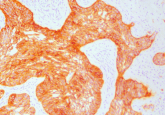Simple blood test could improve detection rates of severe liver disease

Researchers from Cardiff University (Cardiff, UK) have developed a noninvasive mass spectrometry (MS)-based analytic platform that could be utilized to determine the onset of non-alcoholic steatohepatitis (NASH) in an individual through the analysis of lipids, metabolites and clinical markers in blood.
The study, published in Clinical Gastroenterology and Hepatology, utilized information collated from 318 liver biopsy subjects to measure levels of lipids and metabolites in blood samples from individuals who underwent biopsy due to suspected NASH. The samples were randomly divided into estimation and validation groups, where Gibbs sampling and stepwise logistic regression were performed to fulfill the Bayesian information validation criterion.
The team developed the NASH ClinLipMet scoring method, which used information from clinical data and MS-based factors to identify a number of biomarkers such as glutamate, isoleucine, glycine, AST, fasting insulin and the PNPLA3 genotype, which could be used as potential indicators of NASH.
In the investigation, the NASH ClinLipMet score identified patients with NASH with significantly higher accuracy than the NASH clinical data or MS-based profiling alone.
At present, liver biopsies are the only diagnostic method available despite being an invasive and costly procedure. The findings of this investigation could lead to the development of a simple non-invasive blood test that could identify the onset of the disease, before inflammation damages the liver.
Lead author, You Zhou (Cardiff University) commented: “Many people with non-alcoholic steatohepatitis do not have symptoms and are not aware they are developing a serious liver problem. As such, diagnosis often comes after irreversible damage is done.”
“Our quicker and less invasive method of diagnosis could mean that more people with non-alcoholic fatty liver disease could be easily tested to determine whether they are progressing to non-alcoholic steatohepatitis, the more severe form of the disease.”
Further research is required to investigate this method further, but the initial results look positive for the development of a noninvasive simple blood test that clinicians could utilize to provide effective medical care for patients at high risk of the disease.
Sources: Zhou Y, Orešič M, Leivonen M et al. Noninvasive Detection of Nonalcoholic Steatohepatitis Using Clinical Markers and Circulating Levels of Lipids and Metabolites. Clin. Gastroenterol. Hepatol. 14(10), 1463–1472 (2016);
www.cardiff.ac.uk/news/view/482735-non-invasive-diagnosis





